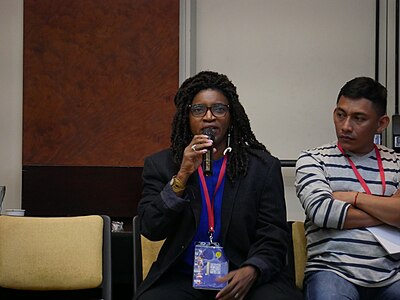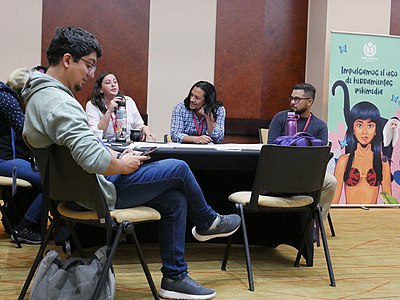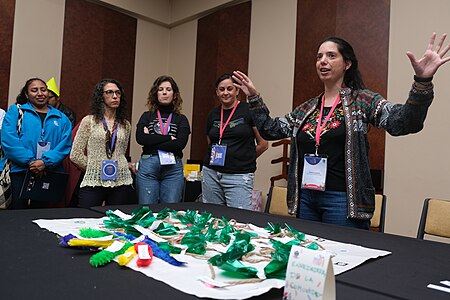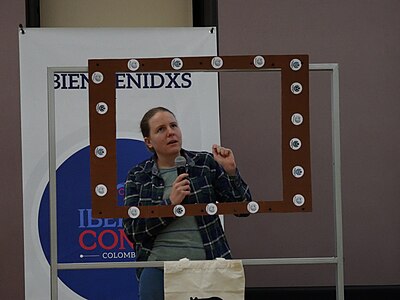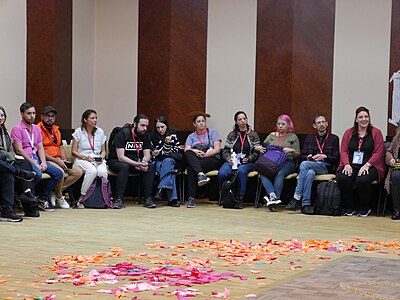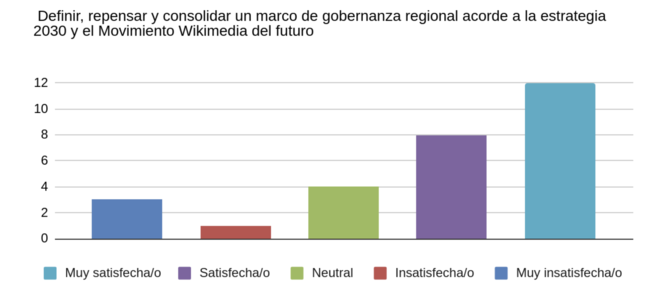Grants:Conference/WMCO/Iberoconf 2023/Report
- Report under review
- To read the approved grant submission for this project, please visit Grants:Conference/WMCO/Iberoconf 2023.
- Review the reporting requirements to better understand the reporting process.
- Note that if a grantee is unresponsive or uncooperative for 21 days or more, this report will be moved by WMF to incomplete.
- With questions about commenting on a report, or with questions about submitting a report, please Email conferencegrants at wikimedia dot org.
- Review all Conference Grant reports under review.
General Overview[edit]

The seven version of Iberoconf
Iberoconf 2023 was held from February 24-26, 2023 in Bogota, Colombia. Thirty-six (36) representatives from twenty-four (24) emerging groups, user groups and chapters from Latin America, Ibero-America and the Caribbean; eight (8) members of the Wikimedia Foundation team, the CEO Maryana Iskander and two (2) members of the WMF Board of trustees; as well as ten (10) volunteers from Wikimedia Colombia who supported the logistical, methodological and thematic development of the event.
This version of the conference was organized by Wikimedia Colombia, with the leadership of the board of trustees and assembly of associates, and the support of the Wikimedia Colombia staff, the team of facilitators and communicators.
Event development[edit]
Iberoconf 2023 was planned and developed by Wikimedia Colombia in October 2022. However, since 2019 Wikimedia Colombia had assumed the organization of the conference in 2020, which was postponed due to the global pandemic because of COVID-19.
For the organization of the event, Wikimedia Colombia was in charge of doing all the review of locations, budgets, logistical issues, among others. It also convened a group of leaders who had previously organized versions of Iberoconf in the region so that they could accompany the realization of the event. The planning was entirely in charge of Wikimedia Colombia with support, guidance and accompaniment of Wikimedia Argentina, Wikimedia Mexico and Wikimedia Foundation, mainly.
Planing[edit]
Organizing Committee[edit]
Wikimedia Colombia convened a group of people who had organized previous versions of Iberoconf to form the organizing committee of the event.
| Name | Experience in organizing Iberoconf |
|---|---|
 Anna Torres |
Cumbre Iberoamericana de Wikimedia 2011 (Buenos Aires, 24-26 de junio)
Cumbre Iberoamericana de Wikimedia 2014 (Buenos Aires, 21-23 de noviembre) Cumbre Iberoamericana de Wikimedia 2017 (Buenos Aires, 10-12 de junio) |
 Ivan Martínez Voluntari Wikimedia México |
Cumbre Iberoamericana de Wikimedia 2013 (Ciudad de México, 12-15 de octubre) |
 Carmen Alcazar Directora Wikimedia México |
Cumbre Iberoamericana de Wikimedia 2013 (Ciudad de México, 12-15 de octubre) |
 Mónica Bonilla Coordinadora general Iberoconf 2023 |
Iberoconf 2023 (Bogotá, 24-26 de febrero de 2023) |
Invitations to Iberoconf 2023 - Selection of participants[edit]
The list of attendees consisted of two types of participants.
- Iberocoop affiliates
- Emerging groups, user groups and chapters from the region.
Initially, this version of the event would be composed of two main moments: 1) a space for Iberocoop's work and decision making, and on the other hand, 2) work and dialogue spaces for the Latin American region. With this in mind, invitations were sent to representatives of the two groups.
Invited Iberocoop Affiliates[edit]

Invitation to groups, chapters, and emerging groups in the region[edit]

Community Survey[edit]
Iberoconf 2023 is a governance event and therefore 15 Iberocoop affiliates were invited, of which twelve (12) participated in the community survey. The invitation was also extended to twelve groups in the region and emerging groups, of which ten (10) answered the survey. In conclusion, the survey was completed by 22 of the 25 chapters, user groups and emerging groups affiliated to Iberocoop and located in Latin America and the Caribbean that were invited to participate in the event.
The survey responses showed the interests and topics of impact for the participating groups, the topics presented were Iberocoop (Next steps, legacy and governance system), Region (New structure, Governance, Reconnect, Rethink and Reformulate), Strategy 2030 (Invest in skills and leadership development, Increase the sustainability of our movement, and Ensure equity in decision making), and the results were aligned to knowledge transfer and to consolidate an annual work agenda at the Latin American level.
| Topic | Description | Priority |
|---|---|---|
| Iberocoop | Next steps
Legacy Governance system |
High |
| Region | New structure Governance |
High |
| Strategy 2030 | Invest in skills and leadership development Increase the sustainability of our movement Ensuring equity in decision making |
High |
| Results | Knowledge transfer Consolidate an annual work agenda at the Latin American level |
High |
Regarding the objectives, based on the survey conducted, the following were proposed.
- Define, rethink and consolidate a regional governance framework in accordance with the 2030 strategy and the Wikimedia Movement of the future.
- Strengthen the development of capacities, learning and alliances of the participating communities.
- Strengthen and (re) establish our links to build a leading, cohesive and representative network of its current and future members.
Program design[edit]
The program of the event was designed by the program committee, a team composed of Iberoconf 2023 participants. The call to be part of the program committee was public and was communicated through email and Telegram groups. The call invited people who were interested in building the program aligned with the results of the community survey, the approaches of the facilitation team and also the objectives established for the event.
The group of committee members was diverse and representative, with the participation of people who had experience organizing community events, as well as people who were new to the organization and in some cases, Iberoconf 2023 was their first community event.
As guidelines for the construction of the program, the committee took into account the following.
- Results of the community survey
- Iberocoop Sprint
- Integration of the region, emerging chapters and new voices.
- Feedback with the WMCO board and event organizing committee.
- Emerging issues from the community
- Knowledge transfer
- Strategy 2030 and current discussions at the movement level
- External facilitation in the different spaces
- Learnings and challenges
The final agenda included two (2) tracks on the first day, one for discussions and reflections on Iberocoop and its future; and another to reconnect, get to know each other and discuss at a general level among participating communities. In total this day was planned to have eight (8) activities. The second day had a track with four (4) activities and the last day the event would have a closing activity and three networking and recreational activities.

Regarding methodologies and facilitation, the program mixed spaces led by the volunteer community, external facilitation by the team of facilitators, professionals who were present during the entire event. There was also time in the agenda for integration and networking activities outside the conference site.
The program was intended to reflect the interests shown by the participating communities and was organized around the objectives proposed for Iberoconf 2023.
Sprint Iberocoop[edit]
-
200px.
-
200px.
-
200px.
Prior to the Iberoconf 2023 conference, a sprint of the event was held. It consisted of 3 sessions of 2 hours each, where topics of interest to Iberocoop affiliated participants were discussed. The topics addressed were: Legacy, Governance System, and Next Steps. This sprint was facilitated by Iván Martínez.
The three sessions were developed as planned and progress was made in the discussion of Iberocoop and its future. Details of the sessions, reflections and constructions can be found in detail in the document 'Memory of the Iberoconf 2023 sprint'.
Facilitacion[edit]
Ivan Martinez[edit]

Iván Martínez, is an activist for free knowledge and digital rights on the internet. He is currently the Advocacy Officer of the Red por la Defensa de los Derechos Digitales (R3D) and part of the board of Wikimedia Mexico A.C., local representation of Wikimedia Foundation, owner of Wikipedia. He has written more than 300 new articles on Wikipedia in Spanish and has made more than 12,000 edits since 2006. He was also recognized as "Top Writer" of the open knowledge site Quora.com in 2017.
Iván, studied history at UNAM, is a journalist and Wikipedian. His participation has been notable in positions such as president of Wikimedia Mexico A. C., chief coordinator of the eleventh international conference Wikimania 2015, held from July 15 to 19, 2015, member of the Fund Dissemination Committee of the same foundation and volunteer in Wikipedia in Spanish.
Within the event, Iván Martínez facilitated the Iberocoop Sprint, the track Iberocoop and its future at Iberoconf 2023 and the session Iberocoop, legacy, learnings and reflections.
Antonio Lafuente[edit]

Antonio Lafuente (Granada) holds a PhD in physical sciences and works at the Centro de Ciencias Humanas y Sociales (CSIC, Madrid). He has published two dozen books and more than a hundred articles or book chapters, many of them in international journals or publications. He has directed editorial collections on science and his books include Los caballeros del punto fijo (1987), Mundialización de la ciencia y cultura nacional (1992), Ciencia colonial en América (1996), Guía del Madrid Científico: ciencia y corte (1998), El carnaval de la tecnociencia (2007), Las dos orillas de la ciencia (2012), ¡Todos sabios! (2013), slowU (2020), TaDIC, como objeto experimental (2021) and Itinerarios comunes (2022). After many years exploring how science and empire co-produce or how science cannot survive without its publics, he is now more interested in the urban scale of science and, in particular, by the practices associated with the notions of commons, prototyping, citizen lab and open science.
Within the event Antonio Lafuente accompanied two spaces: WikiCafe of the world and the dialogue What can we do together?
Tapirus[edit]
Tapirus accompanies relationship processes BETWEEN collectives or communities through the design and implementation of strategies and mechanisms that promote collective action and collaboration between actors or organizations. The objective of Tapirus' facilitation was to accompany Wikimedia Colombia and Ibercoop in the design and facilitation of meeting and deliberation spaces on aspects of their governance, also for the strengthening of collective action within their collaborative platform.
To this end, Tapirus planned the following objectives within the framework of the event.
- Generate listening spaces prior to the meeting in order to establish bridges of understanding and open communication channels between stakeholders according to their strategic role in the governance of the collaborative platform.
- Design and facilitate spaces that promote dialogue, collaboration and collective action within a relationship interface.
- Within these spaces Tapirus proposed, on the one hand, a methodological strengthening scheme that sought to:
- Create specific listening skills, to deepen communication, productivity and understanding.
- The position the importance of the creation and maintenance of dialogue, concertation and management habits that become an engine of shared prosperity.
- Make known alternative visions of conflict and negotiation that expand awareness of these issues and have an impact on the Coalition's daily life.
- Promote some minimum agreements or pre-agreements among Iberocoop affiliates on the following issues:
- Define, rethink and consolidate a regional governance framework in line with the 2030 strategy and the Wikimedia Movement of the future.
- Strengthen the development of alliances in the management of knowledge of the participating communities.
- Strengthen and (re) establish links to build a leading, cohesive and representative network of current and future members.
At Iberoconf 2023, tapirus facilitated four sessions: Q&A with WMF, Governance Models, How are we addressing gaps from the Wikimedia movement, and, Learnings, Opportunities and Challenges.
Safe Spaces Committee and Policy[edit]
Wikimedia Colombia, provides a harassment-free experience for participants in all our events, whether they are held in person or virtually. In the framework of Iberoconf 2023 Wikimedia Colombia established two tools in case of harassment situations. The first tool was a code of conduct that was socialized with all participants, within this policy definitions are established, actions considered as harassment, consequences, as well as a protocol for action. The second mechanism established was the frendly space committee, which was made up of volunteers participating in the conference, who were convened through an open call.
The code of conduct was based on the WMF Friendly Spaces Policy, the guidelines for friendly spaces, the code of conduct, the event prohibition policy, and both the organizing team and the friendly space committee took the training module on the policy to keep events safe.
Iberoconf 2023[edit]
Conference venue[edit]
Bogota was the host city for the seventh version of the Iberoconf 2023 conference. With the comfort of all participants in mind, and in order to reduce travel time from the lodging site to the conference venue, the Capital Hotel of the GHL hotel chain was chosen.
The conference was held in the Capital Room, the main conference room of the Capital Hotel with a surface area of 182 m² and capacity for 100 people in its different accommodations. This space had the option of dividing the space for the development of parallel workshops. It was equipped with air conditioning, two projectors with their respective screens, private bathroom service, furniture suitable for the different work sessions, hot and cold beverage station, and hotel staff.
In addition, there was a space in the Guadalupe Room, a room with a capacity for 12 people dedicated as a private and organized space to rest, relax, or also to hold parallel meetings. The space was equipped with a box bag, a fire pit with lavender and bamboo scents, a beverage station, a fruit tray, natural flowers, blackboards, a projector and a screen. In terms of connectivity, a wifi network was available exclusively for Iberoconf.
Staff and community of volunteers[edit]
The organization and development of the event was articulated between the community of volunteers of Wikimedia Colombia and the staff of Wikimedia Colombia.
| Name | Role |
|---|---|
| Libardo Muñoz | Representation of WMCO |
| Pilar Saenz | Representation of WMCO |
| Sebastián Correa | Support team coordinator |
| Joan Rodríguez | Agenda and Program Coordinator |
| Frank Ballesteros | Volunteer |
| Alejandro Rojas | Volunteer and logistical support |
| Neima Paz | Volunteer and logistical support |
| Hector Botero | Volunteer and logistical support |
| John Barragán | Volunteer and logistical support |
| Diego Cadena | Volunteer and logistical support |
| Name | Role |
|---|---|
| Mónica Bonilla | General coordinator |
| Diana Calderon | Logistical coordinator |
| Javier Salcedo | Communications coordinator |
| Catalina Rodriguez Fabian Camilo Bautista Nicolas Rodriguez Alejandro Moreno |
Logistical support during the conference (February 26, 27 and 28) |
| Enoia | Conference coverage and communications support |
| Jaime Salcedo | Photographer |
The harmonized work between the community volunteers, the staff, the facilitators of the spaces and also the different committees, made it possible to comply with the requirements of assembly and disassembly, adaptation and supplies for each session and activity programmed in the conference agenda.
Regarding communications, since the planning of the event, a communications proposal was built that included an internal and external communication strategy. Regarding internal communications, communication channels were created in Telegram for participants, stickers were created for the channel, and additionally, David Güiza Caicedo donated the stickers of the project Mi Selección Colombia, which were used in the communication channels. During the event, audiovisual and communications coverage was provided in all spaces, interviews were conducted, recordings were made and material was compiled and is now available on Wikimedia Commons.
Accommodation[edit]
Single rooms in single occupancy with breakfast buffet were available for each participant. On the day of arrival, lunch and dinner were covered at the hotel restaurant for participants who registered at the reception desk.
What happened[edit]
Day 0 (Thursday, February 23)[edit]
During this day the participants arrived in Bogota, Colombia. A van from the Capital GHC Hotel or the Sheraton Hotel, with capacity for fifteen (15) passengers, was available from the airport, this transportation had a periodicity of 30 minutes each way. At the door of the airport, after collecting the luggage, there was a staff person with a WMCO notice, who accompanied each person to the route to the destination. In the case of conference attendees who traveled on flights arriving after 10:00 pm, Wikimedia Colombia assigned private services for airport pick-up and transportation to the hotel.
This day also began the registration of participants and delivery of disinfection kits, as well as delivery of antigen tests, so that they could be tested every day of the conference.
Day 1 (Friday, February 24)[edit]
-
First day, How we are addressing the gaps.
-
First day, Buildings Communities.
-
First day, Strategy and planning 2030.
-
First day, Wikicafé del mundo.
-
First day, Wikicafé del mundo.
-
Carta del movimiento Wikimedia
During the first day of this day, two spaces were created:
- Iberocoop and its future: Behind closed doors and articulating the dynamics of graphic narrative, dialogues aimed at making decisions about the future of Iberocoop and the interests of the chapters and affiliated groups were given.
- Iberoconf: The opening activity "Wiki-cafe of the world" was in charge of the facilitator Antonio Lafuente. The development was given through group work tables, the focus of which focused on discussing and answering basic questions of general interest of the Wikimedian community.
- Afternoon workshops: Wikimedia Movement, Iberocoop and legacy, Strategy 2030, Charter of the movement and addressing gaps from the movement.
- At the end of the day, the invited community gathered to share a welcome dinner in a traditional Bogota place "La Macarena" and taste the typical dish of the city, the Ajiaco santafereño.
Day 2 (Saturday, February 25)[edit]
-
Second day, Governance models.
-
Second day, UCOC y carta del movimiento.
-
Second day, Governance models.
-
Second day, Q&A WMF.
-
Second day, Q&A WMF.
-
Second day, Q&A WMF.
This day the whole group of participants took part in the same activities.
- Q&A with Wikimedia Foundation, was a space facilitated by Tapirus in which questions previously asked by the participants of the meeting were taken.
- What can we do together? It was a dialogue facilitated by Antonio Lafuente, in this space actions and interests of the participants were articulated.
- Models of governance, was a creative workshop in which groups built sculptures regarding the model of governance that the movement needs, this space was facilitated by Tapirus.
- Emerging issues from the community, was an open space in which participants met in groups, interacted with others and discussed topics of interest.
- Finally this day closed with a salsa class and an integration meeting with strategic allies. This activity began with pechakucha style presentations of Wikimedia Spain, Mais Teoría da História, Wikimedia Bolivia and the official launching of the video of the project '21st Century Skills in Action - Wikimedia Internship Program'. Afterwards there was a networking and integration activity.
Day 3 (Sunday, february 26)[edit]
-
Third day, Grupal photo.
-
Third day, MAMO Visit.
-
Third day, Coffee tasting.
-
Third day, Learning and challenges.
This day ended the event and three activities were carried out.
- The event was closed with the activity 'Learnings, opportunities and challenges', by Tapirus.
- The coffee break of the day was a coffee tasting by Café Cultor.
- Urban Exploration: Visibilization of female art in Colombia, was a tour to identify, appreciate and discuss plastic and visual works created by Colombian women.
- The farewell lunch and closing of the event was held at Doña Ofelia, a typical Colombian restaurant located in the center of the city.
During the event we documented what happened in each session and activity through etherpads. More details of the documentation can be accessed through this link.
Reflections on the event[edit]
In the satisfaction survey conducted with all attendees, the fulfillment of the objectives was evaluated, and the results are presented below.
-
First goal Objective 1 evaluation.
-
Second goal Objetive 2 evaluation.
-
Third goal, Objetive 3 evaluation.
In general terms, based on the evaluation survey carried out by the participants, the objectives were satisfactorily met. Some of the evaluations included recommendations regarding the logistics, program and objectives of the event. Based on what the event meant in words to its participants, we constructed a word cloud.

Recommendations for organizations of upcoming community events[edit]
This was the first international event organized by Wikimedia Colombia, during the planning and development we identified successes and activities that we could have done differently in the organization. The initial proposal had changes such as the list of participants, the linking of a team of professionals who were in charge of the facilitation and the participation of the Wikimedia Foundation team. In terms of budget there were also changes, initially we contemplated that the participants would share rooms, that the facilitation would be internal and also not have a communication strategy, however, all these changes were made to improve the event.
We believe that opening up the event and including emerging communities made this meeting a special one. Similarly, having involved the community of volunteers and volunteers of Wikimedia Colombia gave strength and sustainability to the meeting. In this case, this event was the first Wikimedia event for seventeen (17) participants, including six (6) volunteers from Wikimedia Colombia. Regarding the new people, they were received and welcomed by the participants, there were also spaces for the transfer of knowledge and experiences. From the feedback evaluation, the concepts and recommendations of the team of facilitators and also the experience of organizing this event, Wikimedia Colombia wants to leave some recommendations for the organization of future meetings and events.
Logistics[edit]
- Choose comfortable hotels and spaces and balance with the location. In the case of this conference and understanding the problems of mobility in Bogota, we gave priority to the comfort of people and proximity to the airport. In many occasions organizing activities in more central locations can be complicated in terms of mobility and security within the city.
- Open the conference to natural spaces. In this version of the event we were in a hotel that did not have many green areas, and some people expressed the need to have less enclosed spaces for conferences and activities.
- Hire an agency for the purchase and management of tickets. Wikimedia Colombia managed the purchase of tickets through an agency, however, the reservation data and dates were managed by Wikimedia Colombia. Having one party in charge made Wikimedia Colombia's staff have an overload of work, in future events we suggest that the agency is in charge of all the management and has direct communication with the participants.
- Give details of the weather, adapters and so on. During the organization of the event we communicate to the participants details to prepare their trip. We built this checklist with important information to keep in mind when traveling.
- Duration of the event. The event had a duration of three days, however, in the case of people coming from Europe, we extended their trip by one more day so that they could rest for a day and manage jet lag. We suggest to take into account the places, times and also schedule changes thinking about the well being of the participants and their health.
- Participants. The list of participants should be flexible and give the option to invite new communities, representatives and people who contribute to the movement. On this occasion we invited twelve (12) groups from the region that are not affiliated to Iberocoop but we wanted to know more about them, see the possibilities of working together and consolidate alliances.
Methodological[edit]
- Open spaces and proposals so that any interested person can participate.
- External facilitation for complex issues. Getting external facilitation for the most sensitive issues will be of great benefit to the movement. Internal facilitation can be problematic when it is undertaken by non-neutral participants. It is very different to assume a facilitation in terms of coordinating actions than a facilitation that involves dialogue, listening and conflict mediation.
- Internal facilitation to share experiences and transfer knowledge. Within the Wikimedia movement we have experts on topics, leaders who have contributed and helped in the construction of the projects and from whom we can take advantage of their expertise, so including them in the spaces and opening new ones for workshops, talks or dialogues will always be beneficial for the agendas of the meetings.
- Convene a program committee to organize the agenda. Wikimedia Colombia convened a group and nominated people with extensive experience in organizing events, as well as people with little or no experience in the subject. This mix of experiences meant that the agenda was designed so that both new people and people with more years of participation in the community could participate and the spaces were relevant.
- Conflicts. It is necessary to create instances, procedures and means for conflict transformation in the Movement. There are spaces or intersections where relationship interfaces can be established (within Iberocoop, between Iberocoop and other chapters in the region, between the Foundation and Iberocoop, or between the Foundation and other chapters). There are actors involved who have the potential to mediate, but it is necessary to stipulate roles and grant certain recognition.
- Participation and voice of all people. It is very important to capitalize on the meetings to enhance the knowledge and work of the organizations. On the one hand, it is vital to leave or create spaces for free exchanges. On the other hand, it is advisable to appeal to the diversity of the ecosystem to enhance the activities led by the participants. In this dimension, it is possible to give a voice to emerging leaders or people who do not actively participate in the working groups.
- Creation of the agenda together with facilitation.
- Although the participants can autonomously identify possible synergies that allow the establishment of alliances, articulations and collaborations, the methodology itself can enhance these exchanges by providing these spaces or designing activities for the recognition of their own experiences and work projects. These methodologies in no case presuppose that the possibility of discussion, co-creation or formulation of binding agreements is abandoned. On the contrary, the suggestion is to leave aside the conference mode to delve into dynamic models that encourage collaboration among participants.
Agenda[edit]
- Given the desire to maximize the face-to-face meeting, an agenda that covers a wide range of topics is sought. In this sense, the design of the agenda can be strengthened by incorporating the item of rhythms/intensities to ensure that the activities that require a great effort and concentration are distributed in time so as not to overload a single day or day. It is important to visualize the meetings as a whole and under a process framework.
From the movement[edit]
- Conflicts are common in all types of organizations and social articulations. On the one hand, it is advisable to ensure spaces for recognition and listening. This is the starting point. But, on the other hand, in addition to ensuring spaces to deal with the above-mentioned dissent, it is necessary to make way for these to create transformations and commitments for improvement. It is possible to build scenarios of sustainability and follow-up to what has been discussed.
- The Wikimedia ecosystem is based, to a large extent, on anonymity and hard virtual work by volunteers. Strategies can be sought to counteract the fact that different groups do not know each other well unless they are part of groups with a longer trajectory that denote a certain rank or privilege. The openness and transmission of knowledge to emerging groups is decisive for the sustainability of transformations. However, these exchanges are two-way. They are not unidirectional transmissions, but imply reciprocity and mutual influence, as well as the arrival of new agendas and demands.
In the case of Iberoconf 2023, it was held in February, but an event like this should be held in the middle or end of the year. At least in the Colombian context, a part of December and another part of January, were seasons in which companies were on vacation and therefore the organizational dynamics were cut.
The purchase of tickets was also a very complex task, so we suggest hiring an agency to take care of this work. For this conference we asked WMF for support so that the travel agency they hire would be in charge of managing the purchase and reservation of tickets, in this case, we did not receive the support, but it would be very helpful for the communities or groups organizing events if it could be done.
After Iberoconf 2023 we identified that there are many opportunities to continue working and cooperating at the movement level, both in Latin America and in Ibero-America and the Caribbean. We propose some ideas or topics that could give us ideas for the next steps.
- Iberocoop: it was proposed to have a call after the event to see the possibilities of its future.
- Networking and cooperation. During the event we identified that there is potential in the idea of 'hubs' and that they are not necessarily contrary to the cooperation networks that already exist in the movement. After the event we have been discussing ideas about the possibilities of thematic hubs, specifically the Gender Hub.
- Governance models. Wikimedia Colombia identified that this issue is very important and we must continue to generate actions and spaces for dialogue for reflection, we also think it is very important to open spaces for new or emerging communities, thinking about the sustainability of the movement.
- Organization of regional events by themes, interests and also where impact projects are proposed at the movement level from the agendas of the communities involved.
- Leadership training and transfer. During the governance model sculpting activity, one of the challenges encountered was the input and output, as well as the transfer of leadership. This is an issue that we should continue to build and work on.
Communications[edit]
With respect to communications, several internal and external communications strategies were supported and developed within the framework of the conference.
- Web development and creation of the event page in Meta. All event information was centralized in Meta.
- Graphic line of the event.
- Content planning and management: Iberocoop Sprint, Telegram group and email.
- Contents and formats (publications, communications, checklist, invitation letter, among others).
- Audiovisual coverage of the event.
- Photographs
- Category: Iberoconf 2023
- Videos
- Photographs
- Social media and free press publications
- Colombia en el centro de Wikimedia
- Colombia en el centro de Wikimedia
- Iberoconf, una conferencia en torno a la producción de contenidos en Internet
- Interview with Mónica Bonilla on Blu Radio, for the program Blu 4.0 on April 20, 2023.
Financial documentation and report[edit]
- Budget table
| Nr. | Item description | Budget | Final cost | Currency | Notes |
|---|---|---|---|---|---|
| 1 | International flights | $180.201.517,95 | $166.773.668,00 | COP | Roundtrip airline tickets to and from the place of origin, added value of modifications due to itinerary changes and flight cancellations |
| 2 | National flights | $6.171.730,00 | $5.244.638,00 | COP | Corresponds to volunteers and invited community |
| 3 | Assistance cards | $10.780.000,00 | $0.00 | COP | This item was used to support the integration meeting on Saturday, February 25. |
| 4 | Accomodatios - Rooms | $10.745.700,00 | $39.412.800.00 | COP | Difference between the value of the initial budget corresponds to: change of double rooms for single rooms, extension of lodging for 10 participants, Facilitators 3 nights, Logistics Coordinator 3 nights, taxes and rate increase due to change of fiscal year. |
| 5 | Hall for event | $0.00 | $0.00 | COP | |
| 6 | Audiovisual aids (sound, screens, video beam, microphones, exclusive wiki channel, fixed internet point) | $3.693.600,00 | $14.438.270,00 | COP | Corresponds to wifi channel exclusivity for 60 users x 3 days + audio-visual aids. |
| 6 | Facilitators (Tapirus) | $0.00 | $16.340.600,09 | COP | This item was not included in the initial budget. |
| 7 | Facilitators Antonio Lafuente | $0.00 | $0.00 | COP | |
| 8 | Graphic Narrative | $0.00 | $2.023.000,00 | COP | This item was not included in the initial budget. |
| 8 | CEO Interpreter (Maryanna Iskander) | $18.000.000,00 | $1.400.000,00 | COP | |
| 9 | Covid Kits Protocol | $6.913.200,00 | $1.495.000,00 | COP | |
| 10 | Conference menu (Lunch, dinner and coffee break AM-PM) | $25.320.600,00 | $18.820.757,00 | COP | |
| 11 | Welcome dinner | $7.210.500,00 | $3.960.000,00 | COP | |
| 12 | Integration meeting | $0.00 | $9.910.528,00 | COP | This item was not included in the initial budget. |
| 13 | Farewell lunch | $0.00 | $3.390.000,00 | COP | This item was not included in the initial budget. |
| 14 | Transportation | $10.100.000,00 | $4.104.600,00 | COP | |
| 15 | Tour Bogotá | $9.162.000,00 | $2.000.000,00 | COP | |
| 16 | Salsa class and musical show | $500.000,00 | $5.355.000,00 | COP | |
| 17 | Guitar rental | $0.00 | $210.000,00 | COP | This item was not included in the initial budget. |
| 18 | Coffee tasting | $0.00 | $6.535.800,00 | COP | This item was not included in the initial budget. |
| 19 | Swag and advertising material | $13.000.000,00 | $15.433.454,00 | COP | |
| 20 | Books | $0.00 | $2.749.500,00 | COP | This item was not included in the initial budget. |
| 21 | Souvenir (fundas, mug, dulces) | $5.700.000,00 | $4.912.000,00 | COP | |
| 22 | Stationery | $1.200.000,00 | $1.558.266,00 | COP | |
| 23 | Comunications | $12.000.000,00 | $30.000.000,00 | COP | |
| 24 | Executive Direction | $0.00 | $0.00 | COP | |
| 25 | Logistics Coordinator | $20.000.000,00 | $20.000.000,00 | COP | |
| 26 | $0.00 | $61.400,00 | COP | ||
| 27 | Photographer | $0.00 | $3.676.400,00 | COP | This item was not included in the initial budget. |
| 28 | Professional graphic design | $9.450.000,00 | $17.500.000,00 | COP | |
| 29 | Logistic support (4) | $1.750.000,00 | $2.240.000,00 | COP | |
| 30 | Legal support | $0.00 | $200.000,00 | COP | |
| 31 | Rental expenses | $0.00 | $926.010,00 | COP | |
| 32 | Contingencies | $43.457.884,00 | $43.457.884,00 | COP | |
| 33 | TOTAL | $395.356.731,95 | $444.129.375,09 | COP |
If you have any tips or insights on creating a budget or allocating funds, please feel welcome to share!
- Summary of funding
Total project budget (from your approved grant submission):126.073,18 USD.
Total amount requested from WMF (from your approved grant submission): 104.268 USD.
Total amount spent on this project (this total should be the total calculated from the table above):117.153,62 USD.
Total amount of WMF grant funds spent on this project:104.268 USD.
Are there additional sources of revenue that funded any part of this project?. Nothing.
- Remaining funds
Are there any grant funds remaining?
- Answer NO.
Please list the total amount (specify currency) remaining here. (This is the amount you did not use, or the amount you still have after completing your grant.)
Evaluation[edit]
Optional - Event Evaluation Toolkit - In this page you can find a list of basic questions that the Wikimedia Foundation uses to evaluate large movement events like Wikimania and other regional and thematic events. Feel free to use any part of these questionnaires to evaluate your own event. You will find: Registration Questions; Post-event questions for participants and Follow-up questions for participants.
Anything else[edit]
Is there anything else you want to share about the conference or event?




